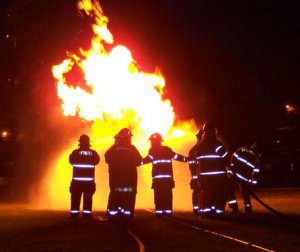Available statistics show that Ghana lost 1.74 million Ghana cedis to fire in the first quarter of 2012 as against 1.62 million Ghana cedis in 2011.
This, according to the Managing Director of Star Life Insurance, Kojo Addisson, should be a worry to government and stakeholders and find a way of addressing.
Mr Addisson was speaking in a phone interview with host of e.tv Ghana’s Awake, Rashida Nasamu on the recent fire which gutted the Mallam Market in Accra on Monday morning. About 200 traders were affected by the fire.
Footage from the scene at the time the Ghana National Fire Service was battling to put out the fire saw people, mostly women, wailing for the loss of their goods and monies.
When host, Rashida sought to find out the role insurance could play in ensuring that people who lose their goods and monies to fire find some solace in the fact that their goods are insured, Mr Addison was of the belief that it indeed could play a role to calm nerves of traders who are hit by such tragedies.
However, he said the need for insuring traders and their wares had not gained priority on the part of regulators as most of their policies are tailored towards corporate institutions and persons, adding that providers also shy away from the markets because of the high risk involved in insuring them.
On the other end, he noted that even if there was, traders were unaware of the scope of cover of neither life insurance nor where to buy them.
Mr Addison noted that the time had come for government and regulators to come together and find a stable platform where these market women can insure their products.
Meanwhile, the Public Relations Officer of the GNFS, Mr Prince Anaglatey who was present in the studio at the time of the interview noted that ninety-nine per cent of market fire outbreaks were preventable but due to the poorly structured nature of the markets, most of them end up in flames upon a small spark of fire.
He said, in as much as he agreed that there was the need to insure traders and their wares, if the other facilities are not in place, the markets would still end up in flames.
He noted that, “most of our markets are not built with fire safety mechanisms inculcated in the design. You get to some of these markets for the first time and you will see that it is just constructed. Markets are supposed to have early detecting and warning systems, fire fighting extinguishers and any other thing so that in case fire starts they should be able to use it to fight it.”
He also mentioned the need for hydrants in the markets as well as the training of traders on the basic skills in fire fighting in order for them to prevent such situations.
General News of Wednesday, 17 October 2012
Source: etvghana.com













